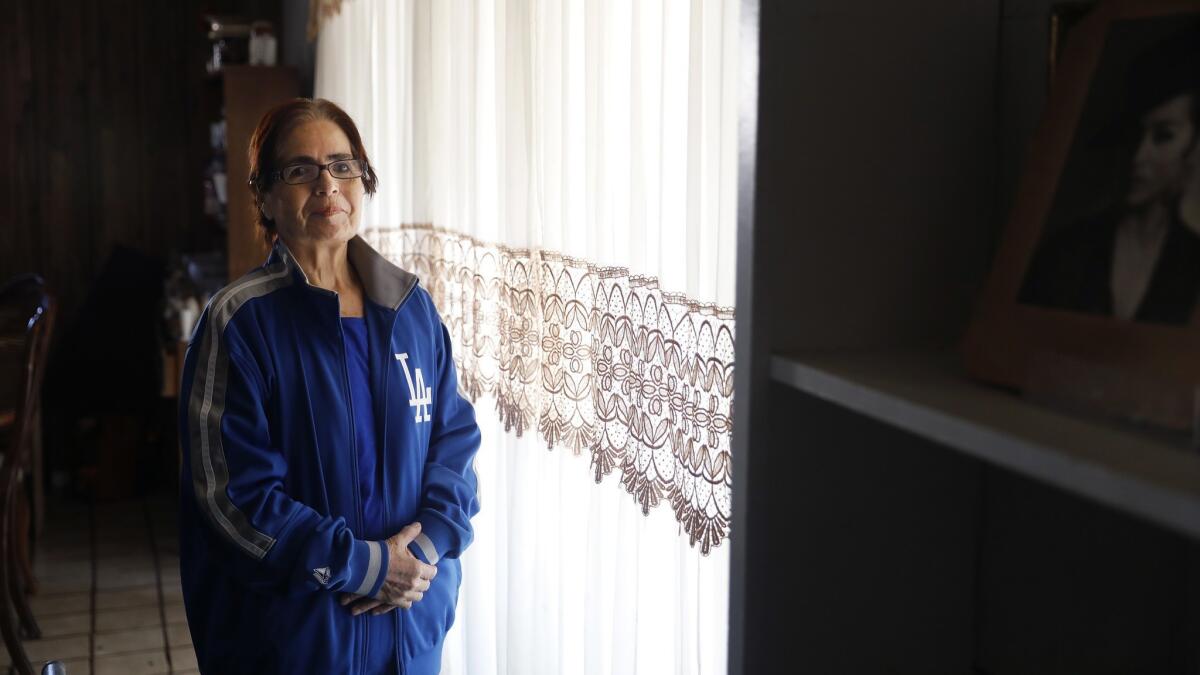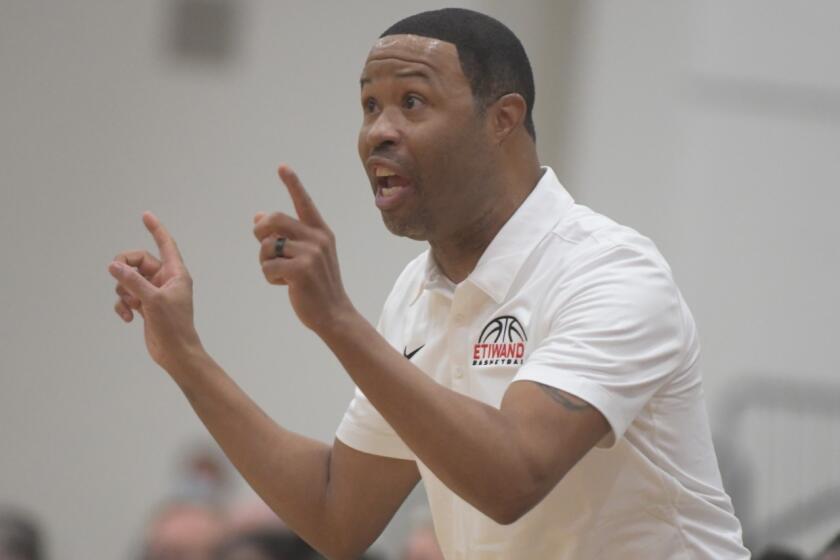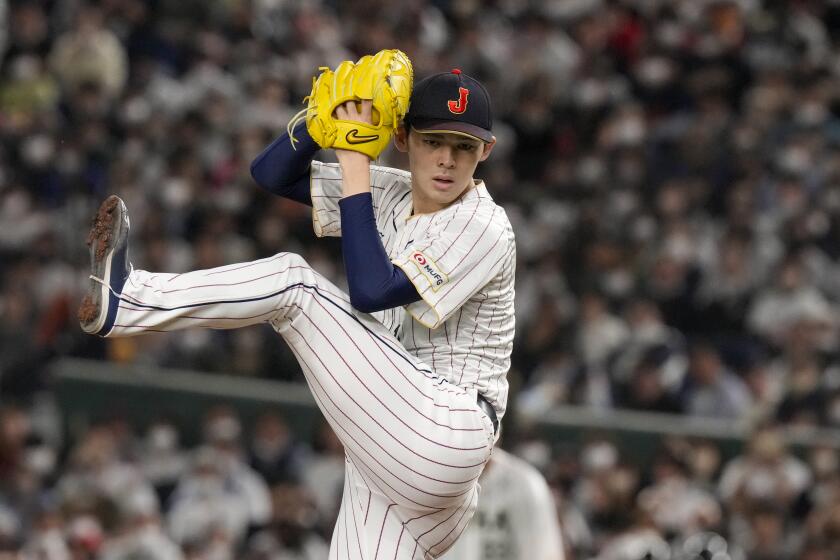Column: After years of watching over others, Dodgers’ ‘mother’ learns others also have her back

- Share via
The game had finished late, extra innings, the column needed rewriting, and I was hustling through the Dodger Stadium press dining room, headed outside to my cluttered laptop and impossible deadline.
That’s when Maria saw me.
I didn’t see her. She saw me. She sees everyone. She is always there, always hovering, the longtime press dining room manager who watches over the media behind thick glasses and a sturdy heart.
Her job finished, Maria Hartmark was heading out the back door to catch a ride to her Carson home when she noticed I was stressed. She stopped me. She smiled. She turned around and retreated to the kitchen.
Moments later, she stepped out with a perfectly wrapped Dodger Dog.
“You eat this, you need this,” she said. “Then you go write a good story.”
I didn’t need a Dodger Dog. Actually, I did need a Dodger Dog. How did she know? She just knew.
For the many writers, broadcasters and engineers who cover the Dodgers on nights that wildly swing from boredom to hysteria, Maria is the rock, our rock, a woman who keeps the soda machine running, the coffee pot full and our heads from exploding.
All of which made it so chilling when, on the first Thursday in October, before the Dodgers’ first postseason game against the Atlanta Braves, this most valuable of players was not in the lineup.
Maria wasn’t there. A day earlier, she had been plowed over by an SUV while crossing a street near her home. She had a fractured skull, fractured ribs, ruptured spleen, broken arm and fractured leg.
She is 69. She is 5 feet 1. Her body was nearly obliterated. When she woke up later at Harbor-UCLA Medical Center, she found herself attached to casts and tubes and rods and dread.
She cried at all hours. She feared for her future. Separated from her baseball life during the most important moments of the season, she felt lost.
Lying broken in a drab hospital room far from the roar of Chavez Ravine, the fallen angel had no idea that, after all these years of watching over others, there was a group of people gathering to watch over her.
::
Maria Hartmark has a saying.
“Treat people the way you want to be treated, help people when they need it, and try to make happy.”
Her brown eyes sparkle when she says it. She jabs her finger into the air to emphasize it. For 28 years as a Levy Restaurants employee at Dodger Stadium, Maria has gone out of her way to live it, first in the stadium club, and for the last 18 years in the media dining room.
She doesn’t drive, so she takes three buses to work. Once there, for at least eight hours, she shovels ice and pours coffee while balancing full trays and dirty plates and massive egos. When she’s finished, a couple of hours after every game, she catches a ride home from any kind soul who will drive her, or finds her way to a downtown bus.
She lost her husband David to lung cancer 19 years ago. She is a breast cancer survivor. She fights a daily battle with diabetes. She earns $14 an hour.
“She is amazing, this woman. She is so sweet, she works so hard, and she’s so nice to everyone.”
— Vin Scully
Yet, in a feat perhaps equal to the athleticism occurring on the field below her, she consistently makes happy.
“She is amazing, this woman,’’ Vin Scully said. “She is so sweet, she works so hard, and she’s so nice to everyone.”
Maria always remembered to bring Scully a bowl of applesauce, his childhood favorite. She would always warm Tom Lasorda’s soup. She places a “Reserved” sign on one of the tables every night so Fernando Valenzuela has a place to sit, and they bond over their shared upbringing in small Mexican towns. Maria came to the United States in 1971.
“But here’s the thing about her — it doesn’t matter who you are; she takes care of everyone the same,’’ says Lon Rosen, the Dodgers’ chief marketing officer. “She’s like everybody’s mother.’’
If you look troubled, she might hand you a cookie. If you walk inside from the adjoining open-air press box in a sweat, she might hand you a bottle of cold water.
She probably won’t know your full name, and almost certainly will not know your media affiliation. She doesn’t own a laptop, can barely work her smartphone, and, despite working with some of the biggest names in broadcasting, watches TV at home on a battered box with rabbit ears.
But she knows you. She just does.
“It’s the eyes; I know everyone’s eyes,’’ she says. “Your eyes talk for you.”
When she sees sadness or distress in those eyes, she springs into action. She will break into song. She will give you a giant and unexpected hug.
“I remember her warm hugs,” says Yvonne Carrasco, former Dodgers public relations staffer. “Somehow she could always tell when I needed a hug.’’
Maria once even impulsively fixed a cup of yogurt and handed it to club president Stan Kasten, without knowing exactly who he was.
“I’ll bring somebody a coffee to soothe their sadness and they look at me like, ‘How do you know, who told you?’’’ she says. “They look at me like, ‘This woman is a witch!’’’
She laughs loudly at this idea of possessing supernatural powers, laughs so hard her battered body shakes in pain. She agreed to visit with me last weekend on only her third day home after six weeks in a hospital and rehabilitation center.
She stays mostly on a hospital bed in the middle of her living room. She cannot move around without a walker. Yet she agreed to be interviewed because she wants everyone to know how much she misses them, and because she wants any chance to rediscover her smile.
“I’m not a witch,’’ she says, laughing again. “I’m just Maria.’’
At times, it seems like she’s from another world, especially when it comes to money. This seasonal hourly worker gives it away like she’s a millionaire. If someone says they can’t pay the $10 dining fee, she will sometimes give them a plate and pay it herself. If someone is celebrating a birthday, she will buy them a piece of cake from a nearby suite.
“She will give anything to anybody in need, and sometimes I’m like, ‘Maria, you’re giving away everything you earn!’’’ says Jeanette Rosales, a longtime dining room cashier. “She won’t listen. She’s one of those people who just loves people.’’
She’s like everybody’s mother.
— Lon Rosen, the Dodgers’ chief marketing officer
Steve Dilbeck, a veteran sportswriter, drove Maria home after every Dodgers home game for two years. She thanked and surprised him with the gift of a watch.
“She is such a warm, friendly face,’’ Dilbeck says. “She makes you feel like family.’’
Dennis D’Agostino, a local author and statistician, spends about 60 nights a year in the Dodgers’ press box, and after each of them she quietly hands him a bottle of water for his drive home. In return, D’Agostino gives her souvenir pins from every major sports event he attends.
“She is always smiling, always in motion, one of those people who is always doing something for somebody,” D’Agostino said.
On the first Wednesday night in October, the motion stopped when she was mowed down by the SUV. Maria has been advised by a lawyer not to talk in detail about the incident, but word spread quickly, and the next night, during the Dodgers’ playoff opener, there was a pall in the media dining room.
Prayers were said. Cards were signed. And then: “People started giving me money to give to Maria,’’ Rosales recalls. “Her family didn’t ask for it. Nobody said she needed it. They just gave it to me, all this cash.’’
Rosales brought the money to Maria in the hospital — and was nearly thrown out of the room.
“I’m not a beggar, I don’t want to be pitied. I’m the one who helps people, not the other way around,’’’ Maria told her.
Rosales consulted with Maria’s three adult children — David, Khristopher and Joanna. They agreed to handle any further donations with a GoFundMe page, setting off more alarms with their mother.
”My mom had never heard of the site. She was like, ‘Go fun? Who’s going? What kind of fun?’’’ recalls David. “We didn’t know what to expect. We just knew we would be needing help. So we figured, well, if somebody wants to help us, we’d give it a try.”
Oh my, yes, somebody wanted to help. Even in her wildest daydreams while taking those three buses to work, Maria Hartmark could not imagine how many people wanted to help her.
The family, still unsure of what to expect, randomly asked for $20,000. And suddenly the woman who would help anyone was being helped by everyone, 211 donations and counting, $24,705 and counting — in a month. Along with phone calls of support, the money poured in, from top Dodgers officials to Dodgers organists, from Dodgers broadcasters to visiting announcers, from local writers to visiting scribes.
When Rosales read her the list of names, Maria cried out in appreciation and shock.
“Why? Why? Why?’’ she wondered.
“You have to ask?’’ Rosales asked her.
By the time the money slowed and a count was made, a surprising milestone was reached.
After all these years of creating a home for the Dodgers media, Maria was given a most appropriate gift in return.
The donations allowed her to pay off her house.
With no mortgage, she can now better handle the costs of her recovery.
“I cannot believe this; I am so grateful to everyone,’’ she says, tears flowing from beneath her thick glasses. “I did not know so many people loved me.’’
Maria will be celebrating Thanksgiving on a table next to her hospital bed in the center of that newly owned home, three bedrooms, two baths, a monument to making happy.
Get more of Bill Plaschke’s work and follow him on Twitter @BillPlaschke











